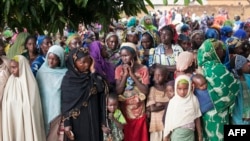Thousands of Central African Republic refugees continue to flood into Cameroon, despite a shaky peace deal signed between the warring Séléka and anti-balaka militias. The refugees fleeing the violence are finding relative peace in Cameroon's refugee camps, but are struggling with growing humanitarian needs and hostile host communities.
Yvette Faradongo has just lost her two-year-old daughter to malnutrition after she managed to save her from the rampant violence in the Central African Republic. Yvette trekked for three weeks from the CAR village of Berberati to eastern Cameroon.
She said she had to run for her life after her son got a bullet in the leg and her sister was killed in confrontations between the Muslim Séléka and Christian anti-balaka rival groups.
Every Central African I met here at the Giwa Yagambo refugee camp in eastern Cameroon has a story of horror, pain and trauma. Francis Ndengo lost his wife in the sectarian violence before escaping the Central African Republic. He said he continued to get bad news from his country.
He said he has just been informed his cousin was shot dead and the rest of his family sought refuge in the Bangui-Bimbo St. Mark Major Seminary, but what is more important for him now is his survival in Cameroon.
The influx of refugees into Cameroon has dropped from 10,000 a week to about 8,000 people per week, according to the U.N. refugee agency. Some humanitarian agencies like the Cameroon Red Cross say the drop is because those suffering from malnutrition cannot make the long and difficult journey to Cameroon.
UNHCR field officer Constancia Terribe said her organization, along with other aid agencies, was doing the best it can to treat the exhausted and malnourished refugees.
“We are working to help all these people recover because they have been traveling for a long time, maybe weeks, or some of them have been walking through the forests, so they come exhausted and they come with some health issues . This is why health is one of the major assistance that UNHCR and its partners give to the refugees,” said Terribe.
Refugee Francis Ndengo said even with their disturbing health conditions, the refugees were still exploited by their host communities and harassed by local government officials.
He said they were not free to move out of the camps even when they were hungry and Cameroon security forces did not recognize their food rationing card issued by the UNHCR as identification documents. He added that some of them were asked to pay bribes to remain in Cameroon. He said some people hired them to work in farms and once the work was done, they refused to pay.
Constancia Terribe said if Cameroon would recognize the identification documents issued by the UNHCR, it would solve some of the problems.
“This is a very young operation and to issue a refugee card, it takes time because it needs to be agreed with the Cameroon government. So we are working on it and we hope that we will be in a position to facilitate this document accrediting them as refugees in this country,” said Terribe.
But a retired engineer from Bangui, Augustine Dolly Debat, said the refugees would not return home anytime soon because Cameroon, for now, was the better of two devils.
He said the question of going back or not would only be addressed when peace returned to his country. If we came to Cameroon, he said, it was because we knew that Cameroon was a peaceful country. So if there were no peace we could not return, and how would the person who decideed to go back home survive after losing everything?
The UNHCR estimates there are now more than 200,000 CAR refugees in Cameroon.











